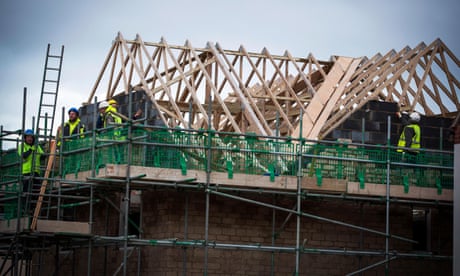
The UK’s construction industry put in its worst performance for 10 months in February after the slowest rise in housebuilding since the summer of 2013.
Concerns that the economy is slowing, difficulties in finding skilled staff and theprospect of Britain leaving the EU helped restrict activity across the sector last month.
The Markit/Cips UK construction purchasing managers’ index (PMI) registered 54.2 in February, down from 55.0 in January, the lowest figure since last April.
Although still above the 50.0 value that separates expansion from contraction, Markit said the latest reading pointed to one of the weakest rises in construction output seen over the past two-and-a-half years.
The figures came a day after the Labour MP Clive Betts, the chair of the local government committee, said the failure of the big housebuilders to speed up development was simply designed to maximise their profits.
Betts said planners were doing their bit, giving the green light to plots for 475,647 homes in England that have yet to be built.
Last year, more homes were built in the UK than at any time since 2008, but the MP said: “It is clear that the big developers are building at a rate to maximise their profits rather than addressing the country’s housing need.”
Tim Moore, a senior economist at Markit, said that while construction firms remained in expansion mode, the loss of momentum in the residential building sector was marked.
“Survey respondents noted that underlying business conditions remained favourable, especially in relation to commercial building and infrastructure-related work, but some clients had been hesitant to commit to new projects so far in 2016,” he said. “Reflecting this, new order growth weakened again and construction firms were the least optimistic about their year ahead growth prospects since December 2014.”
He said the growth in jobs slipped back to levels seen in 2013, as did the level of stock building, which is usually high when companies expect orders to rise.
Mike Chappell, a construction specialist at Lloyds’ commercial arm, said anecdotal evidence showed that the industry was recovering from a dip last year.
“The conversations I’ve had with those in the industry over the past month have been largely positive and many will be surprised to see a dip in the PMI reading,” he said.
“Commercial construction is increasingly buoyant, while in infrastructure, sentiment is also positive, in spite of a number of key projects taking longer than expected to break ground. The reality is [that] contractors are used to such delays and are otherwise comforted by the positive rhetoric suggesting improving the UK’s infrastructure is a long-term priority.
“The great unknown, however, remains Brexit. Many construction firms generate the bulk of their revenues in the UK, but also rely on a steady stream of skilled workers from the EU. They are therefore considering how a vote to leave the union might impact these current arrangements.”




